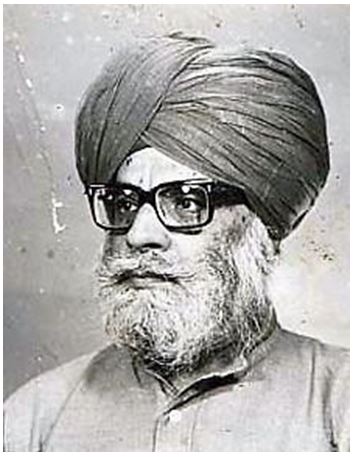KAPUR SINGH, SIRDAR (ICS)

Sirdar Kapur Singh (2.3.1909 – 13.8.1986), son of Bhai Didar Singh, was born at village Chakk (district Ludhiana). He received his early education from Khalsa School Lyallpur, under the guidance of (Master) Tara Singh, the Akali leader. After passed his M.A. in Philosophy from Lahore, he joined Cambridge University, England. In 1931, he received degree in Moral Sciences with first position in the University. Bertrand Russell, who was his teacher at the University, advised him to continue with the University, but he chose to return home. In 1933, he joined Indian Civil Services and worked as the Deputy Commissioner at Jullundur, Jhang, Gujrat, and Karnal etc. In 1953, he was dismissed from job on frivolous charges.
In 1962, he was elected to the Lower House of Indian Parliament. As a member of this house his role was remarkable. His famous speech on the Punjab Bill (September 1966) is a master-piece of Sikh polity. In 1969, he was elected member of State Legislative Assembly. He was the vice-president of Shiromani Akali Dal from 1968 to 1969. The central part of the famous Anandpur Sahib Resolution (Sikh sovereignty) was drafted by him. On October 13, 1973, the title of NATIONAL PROFESSOR OF SIKHISM was conferred upon him by Akal Takht Sahib.
In 1981, he suffered an attack of paralysis, thus bringing an end to his activities. He died, lonely, at the residence of his brother Bhai Suchcha Singh, at Agwar Lopon (Jagraon, district Ludhiana). Sirdar Kapur Singh contributed a lot to Sikh studies. His works include: Hasees, Sachi Sakhi, Pundrik, Bahu Vistar, Sapat Sring, Prasharprashna, The Hour of Sword, Sacred writings of the Sikhs (edited). Guru Nanak University undertook a project to publish his complete works in five volumes. Sirdar Kapur Singh was a great scholar of eastern and western philosophy. As a person, he was a blunt man with authoritative approach of an administrative officer. His family life was not a happy one. Sirdar Kapur Singh had toured several countries of the world. He was so dreaded by the Indian regime that when, in 1981, he was admitted to Brown Hospital, Ludhiana, following an attack of paralysis, and could not be arrested. Darbara Singh, the then chief minister, visited him secretly to verify that he was really bed-ridden. Sirdar Kapur Singh told this fact to this author in June 1983.
(Dr Harjinder Singh Dilgeer)